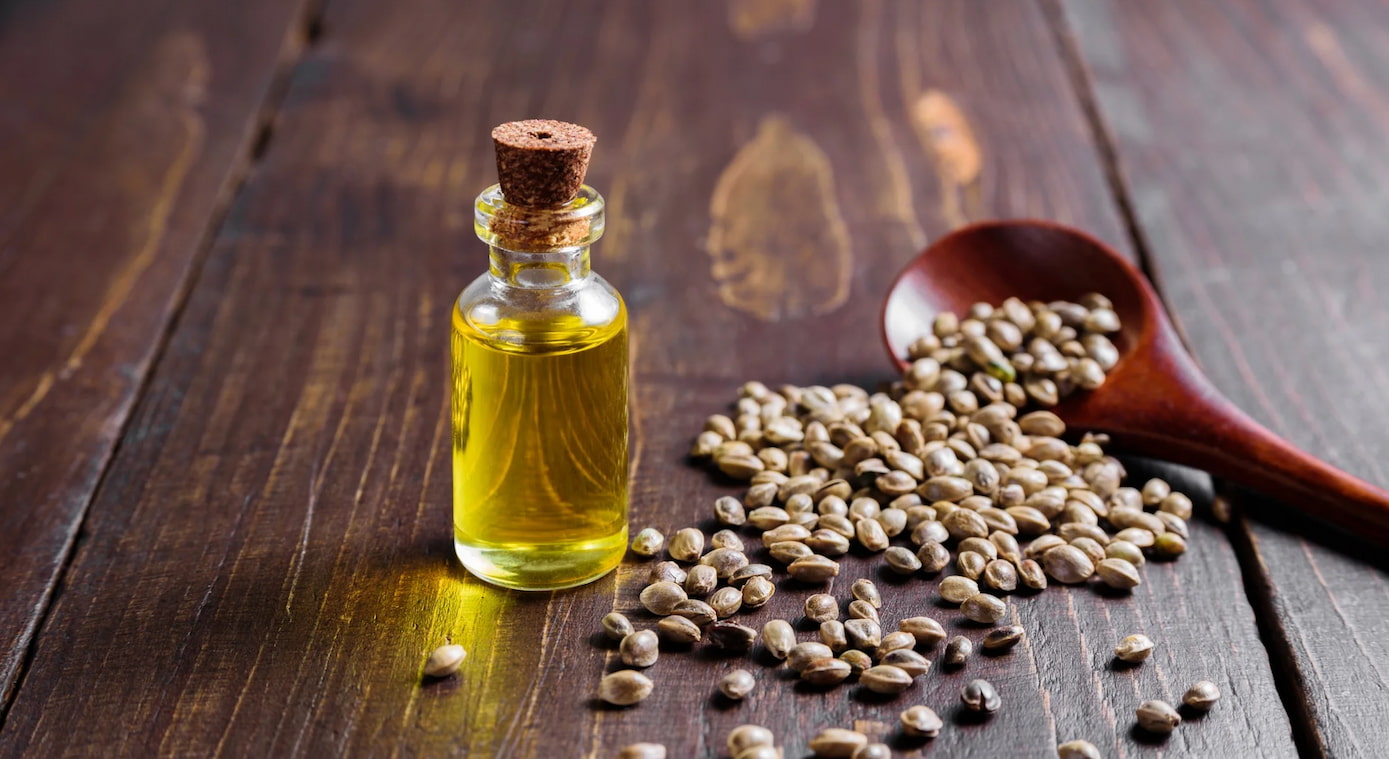What Does Hemp Oil Do? Benefits and Uses

If you’ve seen a rise in hemp products, you may be wondering what exactly hemp can do. But when it comes to this historic plant, the better question may be what can’t it do?
Hemp is a sustainable and fast-growing plant that can be used to create biodegradable cloths and fabrics, replace papers and plastics as an environmentally friendly alternative, and of course, serve as a source of wellness-supporting CBD.
The edible seeds also contain a number of vital nutrients, and obtaining those nutrients and their many benefits is made easy with hemp seed oil.
What Is Hemp Seed Oil?
Much like it sounds, hemp seed oil comes straight from the hemp seed. Typically, hemp seeds are cold-pressed to separate the oily liquids from the solid parts of the seed. The liquid extraction becomes hemp seed oil, while the solid hemp hearts can be used in other ways, such as being ground down into hemp protein powder.
While the hemp plant does contain levels of CBD and THC (tetrahydrocannabinol), these cannabinoids are found within the leaves, stems, and flowers of the matured hemp plant. The seeds, on the other hand, have no CBD or THC, and do not cause any of the psychoactive effects associated with the cannabis plant, or marijuana.
Don’t be discouraged by the low level of cannabinoids as compared to CBD oil — we promise these seeds still hold a number of invaluable health benefits all their own!
What’s in Hemp Seed Oil?
Pure hemp seed oil is extracted directly from the hemp seeds, with nothing else added to it.
The nutrient-rich hemp seed is full of terpenes, proteins, fatty acids, fiber, vitamins, and minerals. It is no wonder this hardy seed has been dubbed a superfood, and the extracted hemp seed oil provides all of these nutrients and compounds in a convenient and absorable form!
What Are the Benefits of Hemp Seed Oil?
So, how exactly can the nutrients of the hemp seed oil benefit your wellbeing? From hormone to hair health, let's uncover a little more of just what hemp seed oil is capable of.
Supports Healthy Hormone Function
Our bodies rely on hormones, or chemical messengers, to help maintain balance and carry out necessary bodily functions.
Hemp seed oil actually contains polyunsaturated fatty acids called gamma-linolenic acid (GLA) and linoleic acid, which can help support healthy hormone function within the body.
Supports Heart Health
Multiple properties within the hemp seed can support your heart.
Hemp seed oil has the desirable 3:1 ratio of the essential fatty acids omega-6 and omega-3, which is considered the ideal ratio for providing heart health benefits, and is not found in most other vegetable oils. These fatty acids can maintain healthy levels of LDL cholesterol, while the GLA is thought to help the body support circulatory health to keep plaque at bay.
Through these important fatty acids, incorporating hemp seed oil into your routine can support the healthy function of your heart.
Hemp seed oil also contains the amino acid arginine. This amino acid helps build protein within the body, and can also help relax blood vessels.
Provides Immune Support
Hemp seeds are a complete protein, meaning they contain all 20 amino acids, including the nine essential amino acids that the body cannot produce on its own. Amino acids are vital for building protein within the body, and those proteins can support a healthy immune system.
The fatty acids found in hemp seed oil can also provide energy that supports the immune system in regular healthy function.
Soothes Feelings of Discomfort
The gamma-linoleic acid is thought to play a role in easing tension in the body and soothing sore muscles or joints thanks to the fatty acid’s roles in regulating inflammatory pathways throughout the body. Its nourishing properties can also work to hydrate and moisturize irritated skin when applied topically.
Supports Cognitive Function
The 3:1 ratio of omega-3 to omega-6 fatty acids doesn’t only support the heart, but the brain as well. Studies suggest that at this level, these fatty acids can help support memory.
Supports Digestive Balance
Hemp seed oil contains both soluble and insoluble fiber, both of which play an important role in helping the body digest food and maintain regularity. The essential fatty acids in hemp seed oil are also thought to support the microbes in the gut flora, which can help promote healthy digestion.
Hydrates the Skin
If you’re looking for the perfect tool to combat dry or cracking skin, try adding hemp seed oil to your skincare regimen. This nurturing oil is easily absorbed into the skin and the fatty acids can work wonders when it comes to supporting the skin barrier in holding moisture to prevent dryness and dehydration.
Because hemp seed oil is rich in vitamins and minerals such as vitamin C, B vitamins, iron, and magnesium, it also has antioxidant properties. When regularly consumed or even topically applied, antioxidants can help protect skin from oxidative stress, which helps prevent the signs of aging.
Supports Hair Health
The hydration doesn’t stop with the skin; hemp seed oil can also be applied directly to the hair to help add moisture and shine. The essential fatty acids can even support healthy hair growth.
How Can I Use Hemp Seed Oil?
Another benefit of hemp seed oil is that there is no shortage of ways to use it!
While you can simply eat a few tablespoons of hemp seed oil raw, incorporating it into food may be a more enjoyable way to take advantage of its health benefits.
With a nutty and somewhat earthy flavor, this oil can be incorporated into everyday meals, too:
- Drizzled as a salad dressing on raw or grilled veggies
- Mixed with pesto for a feel-good pasta dish
- Stirred into nut butters or frostings
- Blended into your favorite pre or post-workout smoothie
- Added to your favorite sandwich smear
Hemp seed oil can also serve as a no chemical, single-ingredient, sustainable replacement to your moisturizer. Simply apply the oil topically to moisturize skin by massaging a small amount of the oil into the dry, irritated part of your skin as needed. You can even follow your face-washing routine by massaging hemp seed oil into the face to help the skin retain its moisture.
For hair health, apply to damp or wet hair after washing and leave in for five minutes to an hour before washing out, depending on desired moisture.
It is important to note, however, that hemp seeds and hemp seed oil are somewhat fragile and can lose much of their nutritional value when met with heat. With this in mind, you may lose out on health benefits if using as a cooking oil or incorporating into food before cooking or baking.
To get the most out of your hemp seed oil, avoid heat — add it to your food-based creations once they have already been cooked.
How Should I Store Hemp Seed Oil?
It is important to store hemp seed oil in an airtight container in a cool and dark place; over-exposure to air and heat can degrade healthy fatty acids. Once opened, it is best to refrigerate hemp seed oil to extend its shelf life.
Precautions
Hemp seed oil is extremely safe. However, there is always the risk of too much of a good thing, so it is best to keep your daily intake of hemp seed oil to about three tablespoons per day.
Too much hemp seed oil may also react negatively with certain medications such as diuretics and cardiac glycosides, so check with your doctor if you have any questions or concerns.
Final Thoughts
Hemp seed oil provides a versatile way to benefit from the fatty acids and many other nutrients within the hemp seed. And if oil isn’t your thing, there are other ways to enjoy the benefits that the hemp seed superfood has to offer!
Hemp seeds can be:
- Eaten raw or roasted–great to sprinkle into a salad or grain bowl!
- Ground into a delicious and filling protein powder
- Incorporated into fan-favorite snacks, such as hemp chocolate or hemp bars
Not sure where to start? Check out our collection of hemp seed oils and other hemp-made products at the evo hemp shop!
Sources:
The importance of the ratio of omega-6/omega-3 essential fatty acids | Biomed Pharmacother
Fatty acids and immune function: new insights into mechanisms | Br J Nutr
- Tags: food



